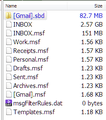
Synchronization and Message Download?
I have read the Thunderbird help file on IMAP Synchronization but I do not have the options shown on the screenshot (I am using the latest TB v.115.4.2 (32-bit).
As I understand it, Synchronization is done automatically for all headers on the server (which is what I want). Is that correct?
When I read a particular message, is the message body and attachment(s) downloaded locally automatically (regardless of any settings)?
Let's say that I want to download all messages (read or unread) with (or without) attachments for the last 365 days: The Synchronization & Storage Settings settings show: 1. Message Synchronizing - Keep messages in all folders for this account on this computer Does that refer to the header Synchronization? 2. Disk Space - To save disk space, downloading messages from the server and keeping local copies for offline use can be restricted by age or size. This seems clear that it refers to the settings for local download of the messages?
When/how are the messages downloaded?
Can I see in Thunderbird which message have been downloaded locally? If so, how?
I looked at my profile and see a large folder called ImapMail. Does this folder contain the downloaded messages?
Where in the profile are the local headers stored?
Sorry for a lot of questions. TIA!
All Replies (4)
This article may answer many of your questions: http://kb.mozillazine.org/IMAP:_advanced_account_configuration#May_help_prevent_problems
Yes, the Imapmail folder is where IMAP accounts are stored and you can view the message folders there.
David, Thanks for responding but the link that you gave me didn't answer any of my Synchronization/Message Download questions. Maybe you gave me the wrong link?
Note again that I have already read the Thunderbird help file on IMAP Synchronization.
Also, you stated that "the Imapmail folder is where IMAP accounts are stored and you can view the message folders there." My question was if this is where the downloaded messages are stored or are the cashed headers stored there - or both?
I am still confused about the handling of headers vs downloaded messages.
Muudetud
I thought the article explained about headers and messages. The folders mentioned are where headers and messages are stored. As the article indicates, headers go there and messages when referenced. If you want messages available when offline, check the advanced button in the synchronization setting. To ensure all download, click file>offline>download
Thank you again David for your answer. However, I am still not clear on how this works. Could you maybe please answer point-by-point?
1. As I understand it, Synchronization is done automatically for all headers on the server regardless of any settings?.
2. When I read a particular message, is the message body and attachment(s) downloaded locally automatically (regardless of any settings)?
3. If I check "Keep messages in all folders for this account on this computer", will that download all messages body and attachment(s).
4. When/how are the messages body and attachment(s) downloaded locally? Is it done "randomly" when TB is open? I do not have the option that you mentioned "check the advanced button in the synchronization setting. To ensure all download, click file>offline>download" (The Advanced button just lets me select what folders to include). I do have another option though if I want to force the download: File>> Offline>Download/Sync Now... However, does this mean download of messages header or body and attachment(s)?
5. Can I see in Thunderbird which messages body and attachment(s) have been downloaded locally? If so, how?
6. The folder "ImapMail" has a subfolder for my mail account "imap.gmail.com". It has the files and a folder as shown in the attached image. Which file(s) contains the messages body and attachment(s) and which one(s) contains the headers? The file "INBOX" is the largest so I assume that is for the messages body and attachment(s)?
TIA!!
Muudetud

